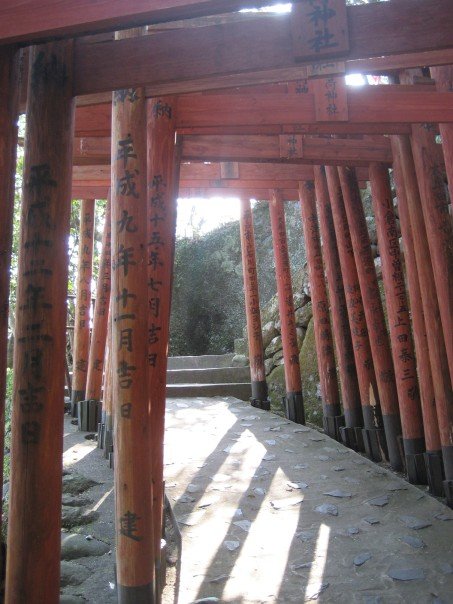Q: Murakami sometimes directly incorporates English phrases into his novel. Does that fit well in your translation? For example, in “Nejimaki-dori Kuronikuru” (The Wind-up Bird Chronicle), he used the phrase, “Kojinteki ni toranaide kure,” which is obviously from “Don’t take it personally.”
A: The problem is to translate it “back” into English that is as unusual as the Japanese, but often I lazily go for the “original” English expression. This way, the batakusasa (Western air) of Murakami’s style is lost. Sorry.
So let's get this out of the way: I am not Japanese. Most of what I have to say in this post could be explained away by saying "You just don't understand how to make a sentence like a real Japanese person does."
Fair enough.
Right then.
The number one problem I have in co-authoring an all Japanese blog with my Japanese wife is, perhaps unsurprisingly, the exact same problem I had co-teaching English with Japanese teachers. They spend all their time addressing the slowest person in the room.
I have an easier time accepting this in the classroom (especially the public one). Sure it ensures that your smart kids only learn as much as the dumb ones, and often turns them off of school altogether. But yeah, everyone has the right to be in school, and 子供1人も置いて行かれないように, and all that.
But when I'm writing my blog, for my imagined audience, who are all as smart as, if not smarter than you, dear reader, I like to think that I'm allowed to set the bar.
Most of the time, when Yuri reads a blog post I've published, and suggests a change here or there, I capitulate. She is the Japanese person, after all.
But a handful of times, I've raised objections. Often I don't want to change something that I wrote deliberately for effect (humorous or otherwise)... and yesterday's blog was just a train-wreck of differing opinions. Here are some examples:
In a post all about going to see what is billed as THE WORLD'S GREATEST sun set ("evening sun" is in the title, and mentioned once again before the sentence in question), I wrote 「落ちる前に 奇麗なレストランを探し、そこでゆっくり見よう。」 "Before it goes down, let's find a nice restaurant and watch it at our leisure."
Now you see why I stopped posting English translations with every post. It sounds pretty vapid in English.
But the point here was, Yuri thought the sentence would be easier to understand if I said explicitly, "Before the SUN goes down." Okay... fair enough. But is it really necessary?
When I wrote about buying two Heinekens, ハイネケン2本、I was advised to say Heineken beers, because some people might not know about Heineken. I think it's safe to assume most of my audience knowns beer. Or that the Japanese audience for a world travel blog knows about Heineken. And even if they don't, they know we bought two bottles of something with dinner, and they won't really be missing out on that much information if that's as far as they get.
The Heineken info was part of an explanation that, as we awaited this beautiful sunset and had dinner, we started to feel less enthused about it. I wrote "As we ate, though, our tension started to drop."
My editor said: "Why?"
For me, when I want to find out the reason behind something written on the page... I keep reading. But, and this isn't just Yuri's opinion, Japanese writing doesn't really make you look that far ahead to get answers. Some might argue it's built into the sentence structure. Get the Where-What-How-Why-Who out in front, before you even get to your verb.
And then finally, I compared this top ranking sunset, which we didn't even end up staying for, with another one that we had watched from a beach days before. The latter was much more... us. It was quiet, we didn't have to put up with an enormous crowd, we didn't have to pay anything to sit on the sand. I wrote "I bet (The beach we watched from) isn't listed anywhere on any kind of ranking. But it was nice (literally: good)."
I'm not winning any awards for prose anytime soon, but sometimes I like saying "It was nice." I like the understatement, the smallness of it... because it matches the mood, the calm, and the much smaller scale (in terms of world-fame, not sun-size) of the viewing experience that we preferred.
But a Japanese person would understand it better if it said "But it was amazingly, superlatively, lovely."
Fine... but that's not HOW I wanted to say it.
This post is hard for me to make, cause it feels a little like a laundry list of complaints about my wife's writing style. But it's not. I've had corrections from professional editors, teachers, translating clients that all speak to the same three issues:
1) Japanese prefers all the information as soon as possible, and outside of a mystery novel, it's wise not to expect people to just keep reading to get the answers.
2) Very little is made of the idea of understanding by context, or looking up stuff you don't know. Someone out there is gonna go "Before it goes down? Wait, before WHAT goes down?" Someone won't like that they had to open a new tab and google Heineken.
3) And last but not last... the same need to declare everything the BEST, the MOST... the squealing "Oishii" and "Kawaii"until we all die phenomenon applies to writing too.
Maybe it's really just a cultural difference. But to me, it feels like dumbing down my writing at best... churning out something generic at worst. "We went. It was really beautiful. We ate. It was really delicious."
I find it harder to take pride in my ability to write and to speak in English these days. I used to consider it my strong suit.
I wouldn't trade in my Japanese to go back, of course, but... man. Man.



